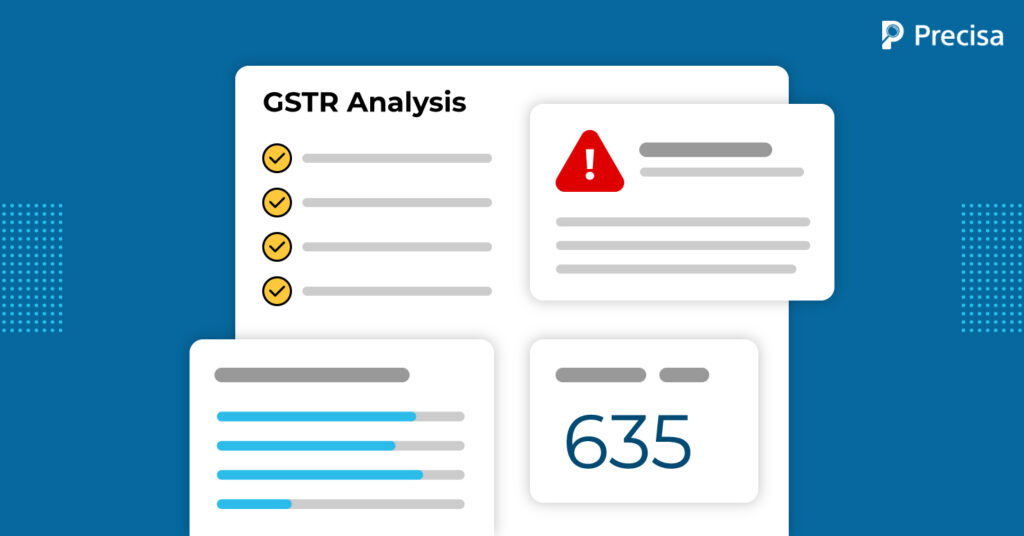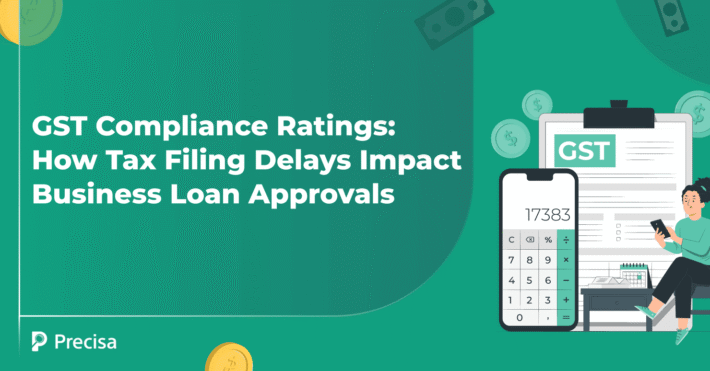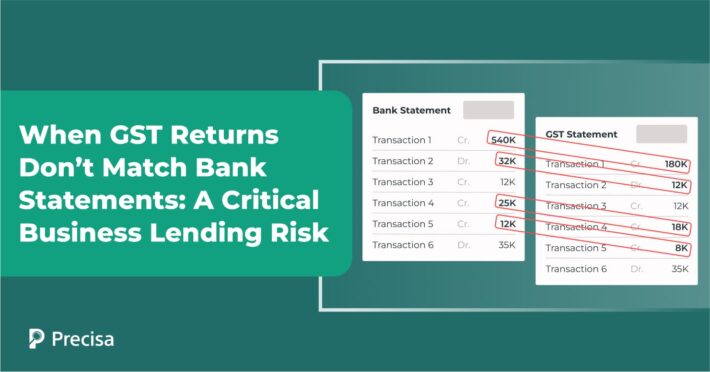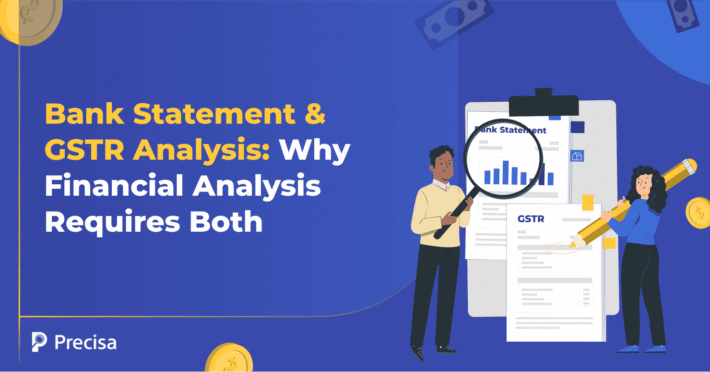GSTR Analysis for Fintech Startups: Why it’s Crucial for GST Review and Compliance

GSTR Analysis for Fintech Startups: Why it’s Crucial for GST Review and Compliance
The supply of goods and services in India is subject to the products and Services Tax (GST). In India, the GST law was enacted in July 2017 and has since replaced several indirect taxes, including VAT, service tax, excise duty, etc. Compliance with the GST is crucial for all Indian firms, including fintech startups. Heavy fines and legal repercussions may follow from violating GST requirements. Therefore, it is essential for fintech startups to perform a GSTR analysis to ensure GST review and compliance. In this article, we’ll review the importance of GSTR analysis for fintech startups and how it may aid companies in maintaining GST compliance.
What is Goods and Service Tax Returns (GSTR) Analysis?
GSTR analysis by fintech startups entails examining the accuracy of the data reported in the returns, tying it to the books of accounts, and looking for any inconsistencies.
Fintech startups can find flaws or omissions in the submitted returns using GSTR analysis and fix them before the deadline.
Additionally, GSTR analysis aids companies in keeping correct records and guaranteeing GST compliance.
GST Compliance Rating and Fintech Startups
All taxpayers who have registered for the GST are required to abide by its laws and norms. The government has established the GST compliance rating, in which taxpayers are assigned a compliance rating score, to track how firms adhere to the GST requirements.
The compliance grade may have a broader effect, influencing anything from tax refunds to supplier partnerships. The main goal of the GST compliance rating is to encourage taxpayers to be compliant and submit GST returns on time.
The GST compliance rating is scored on a scale of 0 to 10, with 10 being the highest and 0 representing the poorest. Fintech startups registered for GST may receive a score from the government.
5 Key Factors Affecting GST Compliance Rating of Fintech Startups
Several factors affect fintech startups’ GST compliance ratings, which are as follows.
1. Prompt Payment of Taxes
Fintech startups must pay the taxes they are due after registering under GST. One of the factors considered is how early one pays taxes and/or if there is a delay in tax payment.
For example, the compliance score could be impacted if the startup is late with its tax filings. This reflects that the startup efficiently adheres to GST rules and regulations, affecting the business’s image.
2. Cooperating with GST authorities
To confirm the address, the tax officials may come to where fintech startups do their businesses. In other circumstances, the startup may have to communicate with tax authorities or respond to their clarifications sought by GST authorities.
Hence, cooperating with tax officials and responding to their queries is crucial as it impacts GST ratings.
3. Timely submission of the GST Returns
One of the key elements affecting the GST compliance rating is timely and accurate GST return submission.
By submitting the GST returns on time, fintech startups improve their compliance rating and increase their ability to claim input tax credits (ITC). Delays in filing returns might delay ITC, affecting the working capital and lowering the compliance score.
4. Timely Reconciliation
Fintech startups and their suppliers must file GSTR-1 and GSTR-3B, respectively, and the transactions on both forms line up if they want to claim the tax credit and submit the GST returns accurately.
The tax return cannot be filed until the information is appropriately reconciled, which will cause a delay in filing the returns
5. Maintaining Current Tax Filing
Maintaining a current tax filing schedule is critical because the GST system is online, and the ratings are expected to be generated automatically. A single late return might impact your score rating.
However, the government also recognises that issues and delays with the GST system (Issue in GST Portal) are not your responsibility. Thus, the score shouldn’t be impacted if the GST portal is down and prevents you from submitting on time.
Why GSTR Analysis by Fintech Startups Crucial for GST Review and Compliance
GSTR analysis is important for GST review and compliance for fintech startups for several reasons:
1. Accuracy in GST Filings
GST returns must be filed appropriately and on time by fintech startups to avoid fines and legal repercussions.
These startups can ensure they have correctly estimated their GST liabilities and claimed the appropriate input tax credit when filing their returns using GSTR analysis.
2. Error Detection
GSTR analysis may aid fintech businesses in spotting mistakes like inaccurate tax computations or input tax credit claims, which can result in fines and other legal repercussions.
Fintech businesses may correct these mistakes and stay in compliance by doing so.
3. Business Performance Insights
GSTR analysis can offer insightful information about how a fintech startup’s business performs.
Fintech startups may determine which parts of their businesses are doing well and which ones require improvement by studying GSTR data. They may confidently use this information to decide their operations and company strategy.
4. Better Management of Compliance:
GSTR analysis can aid fintech startups in better managing their GST compliance. Startups can take remedial action to ensure they adhere to all GST laws and regulations by identifying areas of non-compliance.
This can assist them in avoiding legal problems and preserving their positive market reputation.
5. Getting Ready for GST Audits
Fintech startups must regularly go through GST audits. By ensuring their records are correct and current, GSTR analysis may assist these companies in getting ready for these audits. During the audit process, this might assist them in avoiding fines and legal troubles.
Key Takeaways
The compliance rating influences how other companies and suppliers engage with your business. A better score has advantages such as lowering the likelihood of audits for inspection, quicker refund claims, a strong reputation in the GST ecosystem, and possibilities for business growth and competitive advantage.
Conversely, a poor rating may lead to repeated audits and adversely affect your company’s reputation.
For fintech firms, GSTR analysis is essential for ensuring GST compliance, avoiding fines, managing cash flow effectively, and making wise decisions. Businesses can maintain correct records, enhance compliance, and guarantee efficient operations by regularly completing GSTR analyses.
Fintech startups can also adopt technological solutions that may automate the GSTR analysis procedure, improving its accuracy and efficiency.
Precisa, a cloud-based, intuitive analytics solution with intelligent automation, is designed for decision-makers in lending, insurance, wealth management, and personal finance.
Precisa simplifies bank transactions and the GSTR analysis process with its easy-to-use web application, which allows you to fetch the data in real-time from the source or upload bank statements & GSTR documents. It also presents actionable insights in visually appealing, intuitive dashboards in real-time.
Contact us to know more.




